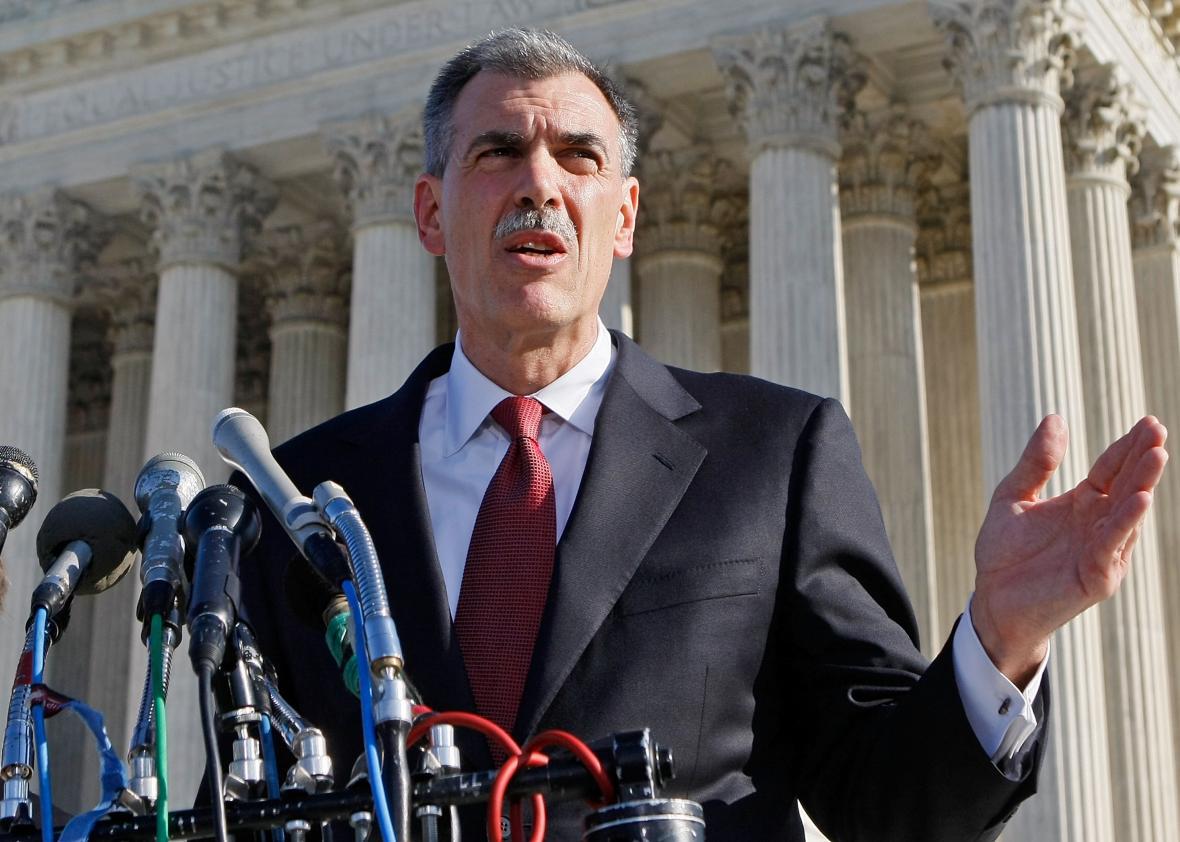Solicitor General Don Verrilli announced on Thursday that he is stepping down after five extraordinarily successful years in the prestigious position. Verrilli’s departure is melancholy for pretty much everyone who cares about the Supreme Court: The country’s top litigator is beloved by court-watchers for his clarity and understated brilliance; esteemed by his colleagues at the top rung of the legal profession—even opponents, with whom he was unfailingly courteous; and respected by the justices for his candor and professionalism. Progressives, especially, have good reason to admire Verrilli, who won myriad landmark cases for the Obama administration. As ThinkProgress’ Ian Millhiser noted, Verrilli’s triumphant defense of the Affordable Care Act—twice!—saved thousands of American lives.
Every court-watcher has their favorite Verrilli argument, and the solicitor general is such a consistently deft and dauntless oral advocate that it’s impossible to choose an objective high watermark. But for me, Verrilli’s concise plea for equality in Obergefell v. Hodges clearly ranks as the pinnacle of his career. As I wrote at the time, Verrilli’s turn at the lectern may well have clinched a victory for same-sex marriage supporters: In just 15 minutes, he refined the momentous issues before the court into a passionate yet doggedly logical disquisition on the equal dignity of gay and lesbian Americans.
What makes Verrilli’s Obergefell performance even more incredible is the fact that, as he was approaching the bench, a deranged protester stood up and shouted “Homosexuality is an abomination!” and “You’ll all burn in hell!” Verrilli actually began his arguments while the protester was still being removed from the building; shouts of “hell” and “abomination” echoed in the courtroom as he started to speak.
Yet the solicitor general forged through it to deliver an elegant affirmation of gay people’s rights. In stark contract with the venomous protester, Verrilli explained that “the opportunity to marry is integral to human dignity”—and that denying this right to same-sex couples consigns them to “demeaning second-class status.”
Justice Anthony Kennedy—the clear swing vote in the case—then asked, “Haven’t we learned a tremendous amount [about gay people] since Lawrence [v. Texas], just in the last 10 years?” (Kennedy wrote the majority opinion in Lawrence v. Texas, striking down sodomy bans.) Without appearing the slightest bit obsequious, Verrilli seized on the opportunity to link Lawrence to Obergefell, telling Kennedy that “we understand now, in a way even that we did not fully understand in Lawrence, that gay and lesbian people and gay and lesbian couples are full and equal members of the community.”
Chief Justice John Roberts tried to differentiate the two cases. Lawrence, he noted, only prevented the state from intruding on same-sex intimacy; Obergefell, by comparison, is an effort to require states to license same-sex relationships. But Verrilli pushed back, explaining that Obergefell must be seen as a natural extension of Lawrence. Because of Lawrence, Verrilli told the chief, gays and lesbians were “in a position for the first time in our history to be able to lay claim to the abiding promise of the 14th Amendment in a way that was just impossible when they were marginalized and ostracized”:
Verrilli must also get credit for effectively parrying Justice Antonin Scalia’s most uncomfortable comment of the day. When Verrilli noted (correctly) that “all of the evidence so far shows” that children fare just as well when raised by same-sex couples, Scalia interrupted.
“All of the evidence shows there’s not a problem?” he asked skeptically. “I think some of the briefs contradicted that.” (He was likely referring to the some of the crackpot amicus briefs that accompanied the case.) Verrilli’s response is an object lesson in intelligent, respectful deflection:
With his time dwindling, Verrilli extracted himself from the usual cacophony of colloquies to deliver what remains one of the finest, pithiest, most moving constitutional defenses of marriage equality. In a world in which same-sex couples “live openly,” raise children, and “contribute fully as members of the community,” Verrilli told the justices, “it is simply untenable to suggest that they can be denied the right of equal participation in the institution of marriage.”
Verrilli concluded his peroration with a declaration of elegant simplicity and remarkable courage. “Gay and lesbian people are equal,” he said. “They deserve the equal protection of the laws, and they deserve it now.”
For gay people who grew up believing their country would always despise them, Verrilli’s closing statement—spoken in the country’s most powerful court, by the nation’s most powerful attorney—was absolutely momentous. Here was the president’s top lawyer arguing vigorously on behalf of a historically despised minority, demanding not a half-measure or a concession but full equal dignity under the law. And, of course, he won, securing the right of all same-sex couples to receive the ennobling rights and privileges of marriage. The solicitor general might not be a household name, but history will remember him well. And every gay and lesbian American who exercises their right to wed has Don Verrilli to thank.
